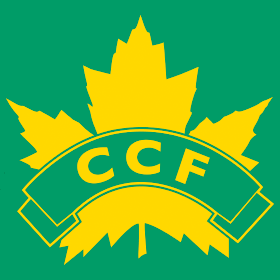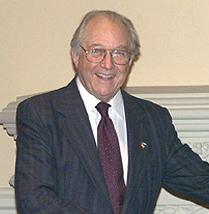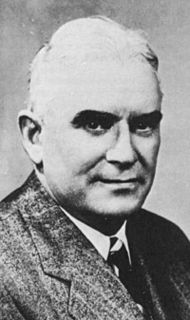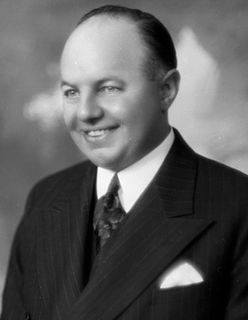
Dufferin "Duff" Roblin, was a Canadian businessman and politician. Known as "Duff," he served as the 14th Premier of Manitoba from 1958 to 1967. Roblin was appointed to the Senate of Canada on the advice of Prime Minister Pierre Trudeau. In the government of Brian Mulroney, he served as Senate Leader. He was the grandson of Sir Rodmond Roblin, who also served as Manitoba Premier. His ancestor John Roblin served in the Upper Canada assembly.
The Progressive Party of Canada was a federal-level political party in Canada in the 1920s until 1930. It was linked with the provincial United Farmers parties in several provinces, and it spawned the Progressive Party of Saskatchewan, and the Progressive Party of Manitoba, which formed the government of that province. The Progressive Party was part of the farmers' political movement that included federal and provincial Progressive and United Farmers' parties.

The New Democratic Party of Manitoba is a social-democratic political party in Manitoba, Canada. It is the provincial wing of the federal New Democratic Party of Canada, and is a successor to the Manitoba Co-operative Commonwealth Federation. It is currently the opposition party in Manitoba.
There have been various groups in Canada that have nominated candidates under the label Labour Party or Independent Labour Party or other variations from the 1870s until the 1960s. These were usually local or provincial groups using the Labour Party or Independent Labour Party name, backed by local Labour Councils or individual trade unions. There was an attempt to create a national Canadian Labour Party in the late 1910s and in the 1920s, but these were partly successful. The Communist Party of Canada, formed in 1921/22, fulfilled some of labour's political yearnings from coast to coast, and then the Co-operative Commonwealth Federation - Worker Farmer Socialist" was formed in 1932. With organic ties to the organized labour movement, this was a labour party by definition.

Douglas Lloyd Campbell, OC was a politician in Manitoba, Canada. He served as the 13th Premier of Manitoba from 1948 to 1958. He was a member of the Legislative Assembly of Manitoba for 47 years, longer than anyone in the province's history.

The Canadian federal election of 1945 was the 20th general election in Canadian history. It was held June 11, 1945 to elect members of the House of Commons of Canada of the 20th Parliament of Canada. Prime Minister William Lyon Mackenzie King's Liberal government was re-elected to its third consecutive government, although this time with a minority government as the Liberals fell five seats short of a majority.
Errick French Willis was a politician in Manitoba, Canada. He served as leader of the province's Conservative Party between 1936 and 1954, and was responsible for beginning and ending the party's alliance with the Liberal-Progressive Party. He also served as Manitoba's 15th Lieutenant Governor between 1960 and 1965.

The Cooperative Commonwealth Federation (Manitoba) (CCF), known informally as the Manitoba CCF, was a provincial branch of the national Canadian party by the same name. The national CCF was the dominant social-democratic party in Canada from the 1930s to the early 1960s, when it merged with the labour movement to become the New Democratic Party. The Manitoba CCF, created in 1932, played the same role at the provincial level.
Francis Lawrence "Bud" Jobin was a politician and the 18th Lieutenant Governor of Manitoba, Canada.

The 27th Manitoba General Election was held on December 16, 1962 to elect 57 members to the Legislative Assembly of Manitoba, Canada. It resulted in a majority victory for the incumbent Progressive Conservatives under the leadership of Premier Dufferin Roblin, securing a third term for the party.

The 1952 British Columbia general election was the 23rd general election in the Province of British Columbia, Canada. It was held to elect members of the Legislative Assembly of British Columbia, alongside a plebiscite on daylight saving time and liquor. The election was called on April 10, 1952, and held on June 12, 1952. The new legislature met for the first time on February 3, 1953. It was the first general election to use a preferential ballot, a short-lived phenomenon in BC. The presence of multi-member districts such as Victoria City with 3 MLAs in conjunction with the Alternative voting system called for an innovation where the district's slate of candidates was split into three "ballots," each with one candidate from each party.

The Ontario general election of 1945 was held on June 4, 1945, to elect the 90 members of the 22nd Legislative Assembly of Ontario of the Province of Ontario, Canada.

The Ontario general election of 1948 was held on June 7, 1948, to elect the 90 members of the 23rd Legislative Assembly of Ontario of the Province of Ontario, Canada.

The Ontario general election of 1951 was held on November 22, 1951, to elect the 90 members of the 24th Legislative Assembly of Ontario of the Province of Ontario, Canada.

The Ontario general election, 1934 was the 19th general election held in the Province of Ontario, Canada. It was held on June 19, 1934, to elect the 90 Members of the 19th Legislative Assembly of Ontario ("MLAs").
Manitoba's general election of June 8, 1953 was held to elect Members of the Legislative Assembly of the Province of Manitoba, Canada. This was the first election held in Manitoba after the breakup of a ten-year coalition government led by the Liberal-Progressives and Progressive Conservatives. The coalition, which began in 1940, was ended in 1950 when the Progressive Conservatives crossed to the opposition side.
Manitoba's general election of November 10, 1949 was held to elect Members of the Legislative Assembly of the Province of Manitoba, Canada.













